UK has experienced 2020 (BBC) as the fifth wettest, ninth sunniest, and the third hottest year on record.
One of the most challenging issues faced by climate specialists is predicting the effects of global warming. If Britain does not take precautions against more extreme weather brought on by climate change, it will see disastrous floods similar to those that swamped portions of Germany this summer. Climate change is happening now. Long-term climatic changes are referred to as climate change, which is typically used concerning anthropogenic climate change. It is one of the greatest issues of our time and has already started to harm our planet and way of life irreversibly.
Numerous variables influence the natural processes that result in rain, hail, and snowstorms, as well as the rising sea level and other predicted repercussions of global warming. There is no doubt about the current global warming rating or the consequences that would result from it continuing.
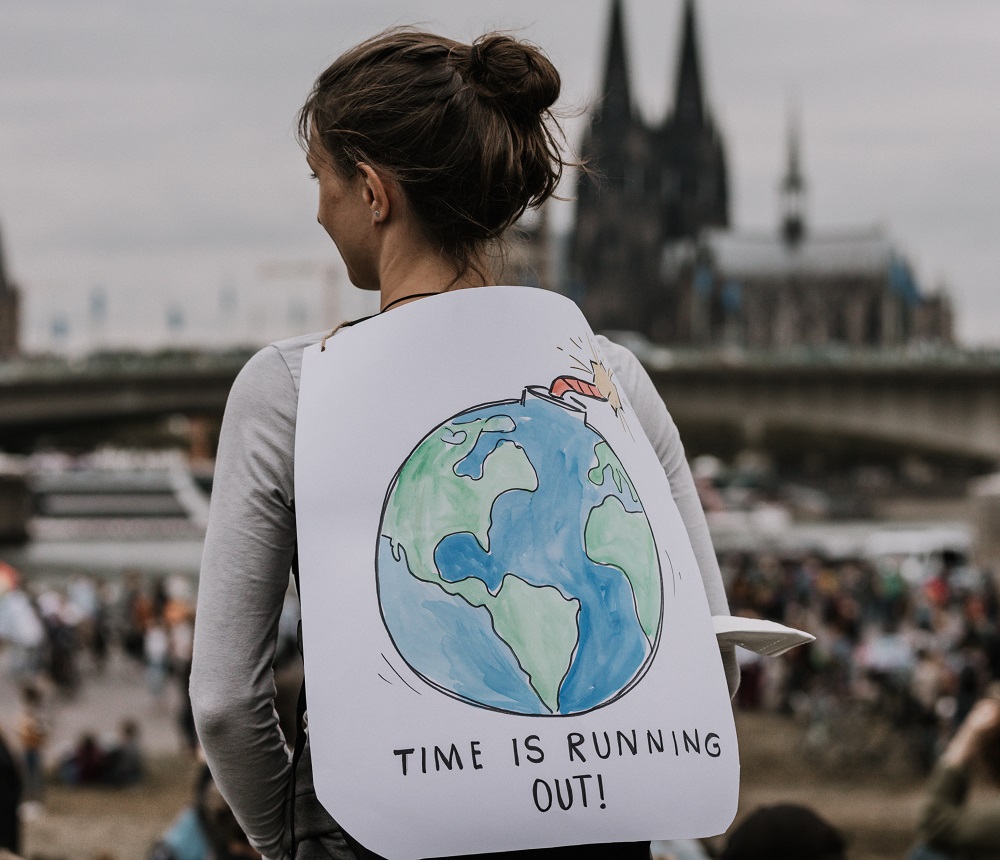
Britain is Shrinking
Britain has been getting smaller for some time, and the island's biggest issue is coastal and land erosion. The government has already informed several regions in the UK that it will not be able to shield them from the rising floods and shifting weather. In the UK, London is especially sensitive to climate change. By 2100, hundreds of dwellings are predicted to be underwater due to the ongoing erosion, drastically reducing the amount of land that can be used.
To guarantee that the UK is prepared to face the difficulties of a warming world, we must continue to strengthen adaptation objectives as we step up our efforts to reach net zero. The papers have warned of the escalating global temperatures brought on by the changing climate, as well as the increasing sea levels, higher river flows, and substantial stresses on England's public water supply. Britain’s coastal communities play a vital role in Britain’s economy.
Reasons for Climate Change in the UK
The UK has been 0.9C warmer and 6% wetter during the past years (BBC), according to the experts. It's not simply the heat that climate change brings. More moisture in the air results from warmer temperatures, which also means more intense storms and flooding. And even cold spells are believed to be caused by the change in the atmosphere. Extreme weather is one way that some of us have already felt the consequences of climate change. Britain’s coastal communities are at huge risk and are needed to be saved.
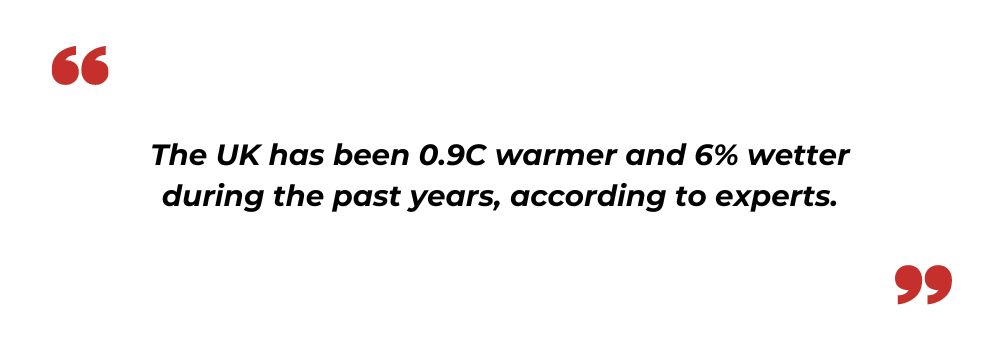
The temperature in the UK has already climbed. Climate change is having a big impact on all over the world. Even though they may appear welcome, unrelenting summer heatwaves are a major consequence of climate change in the UK. Even more, wildfires are spreading around the nation as a result of them.
Here are some of the reasons for Climate Change in the UK -
1. Burning of Fossil Fuels
The amount of heat trapped in the atmosphere has grown as a result of human activities like the burning of fossil fuels and forest chopping. Extreme weather is expected to worsen globally and harm people, animals, and plants. In the UK, the environment, economy, and public services will all be impacted by climate change. More intense weather will cause the climate to alter, becoming hotter and wetter.
Carbon dioxide is released into the atmosphere in massive quantities when the fuels are burnt. Even while experts believe we need a widespread transition to renewable energy and efficiency, fossil fuel businesses continue to be major polluters, producing and marketing fossil fuel goods. It is one of the biggest risks to children's health and future. They have a significant impact on both environmental injustice and social inequality.
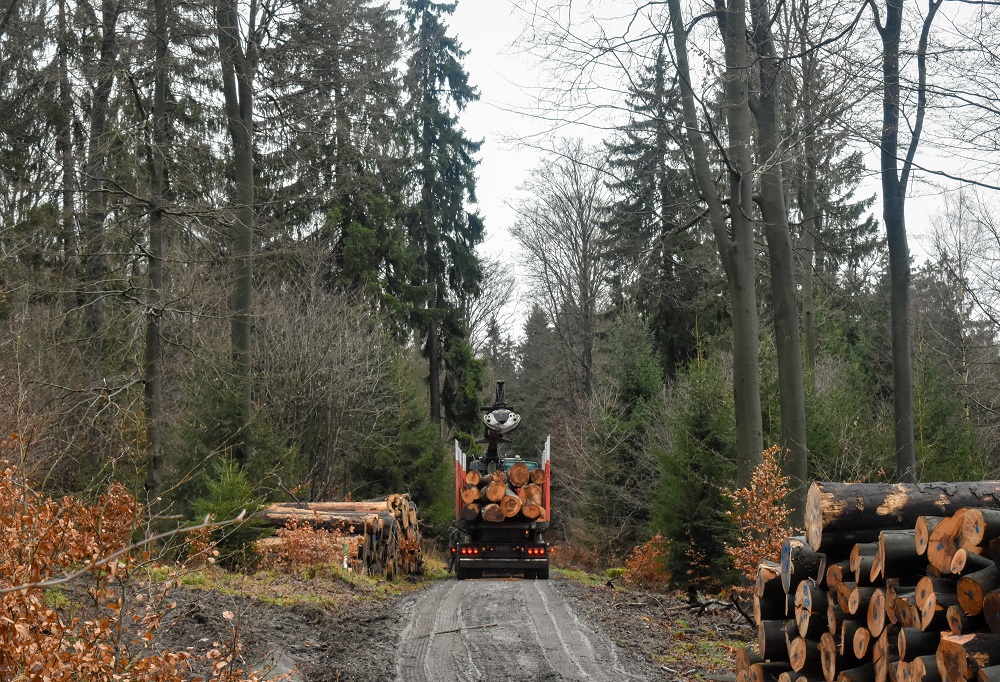
2. Deforestation
Despite all the good that woods do for the environment, they are nevertheless being destroyed at a startling rate. Deforestation causes the loss of several forests every year. One of the main factors that is leading to deforestation is the practice of agriculture. Deforestation has been facilitated by fast food chains. Deforestation is frequently brought on by logging when trees are taken down to make paper. The last significant factor in deforestation is housing.
Forests serve a significant role in a variety of ways, including helping to slow down global warming, housing numerous plant and animal species, and supplying food, medicine, and livelihoods for people all over the world. Even though there are numerous reasons to be concerned about the state of the world's forests, many people remain optimistic that forests may still be saved with the proper policy and perception reforms.
3. Greenhouse Gas
The phrase "greenhouse effect" is used to describe how the Earth is warming. Eliminating carbon emissions is one way we can do our part because greenhouse gases are a key cause of sea level rise. Let's face it, chemicals are essential to our survival. Yes, the cosmetics and laundry detergents we use include chemicals. And then there are the things we never see, like the chemicals and polymers used to construct our homes and automobiles.
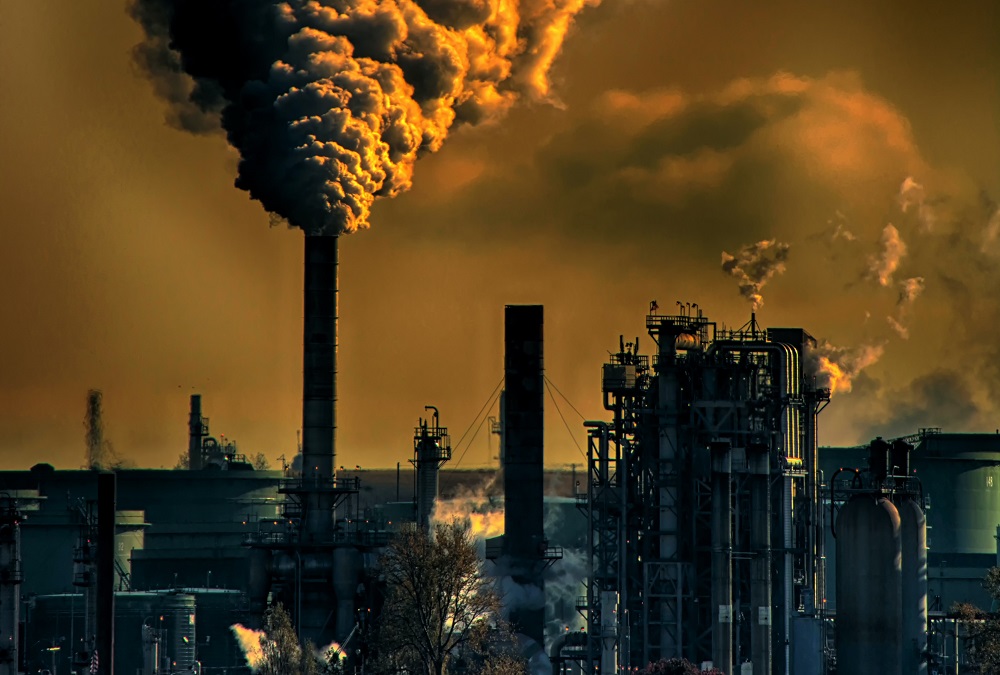
Oceans have suffered as a result of people continuing to release greenhouse gases into the sky. The amount of greenhouse gas emissions in the upcoming decades is equally difficult to forecast since it depends on political choices and technical developments. Sadly, the increase in sea levels worldwide hit a record high of 3.6 inches in 2020 alone, and the pace of rising has doubled for the majority of the 20th century.
4. Chemical Industries
One of the most significant sources of environmental degradation is the chemical sector. The pollution caused by industrial activities, which results in gas emissions, wastewater that pollutes natural ponds and underground water, and solid and slurry waste that, if left untreated, pollutes the soil and underground water, is the primary way that the chemical industry affects the environment and lifestyle. The industry leads to one of the most crucial reasons for climate change.
The demand for new infrastructure is expected to surge as a result of global urbanization and economic development. To limit the negative effects of industry on the environment and, as far as is practical, to restore nature's original conditions, it is obvious that worldwide solutions must be sought.
Risks related to Climate Change in Britain -
1. Homes and Lives
According to the researchers' studies, it would be difficult or unprofitable to rescue many homes, forcing whole towns to relocate inland. Given the speed at which the climate is breaking down, the worth of the properties that are in danger is in the tens of billions of pounds, and the sea level rises that would cause the floods are now all but certain.
Some properties might not be rescued since doing so would be highly expensive. Examples of such precautions include seawalls and other coastal defenses. While Scotland is rising, portions of England, Wales, and southern Ireland are dropping. North Somerset, Sedgemoor, Wyre, and Swale are some of the regions of Britain that are most in danger.
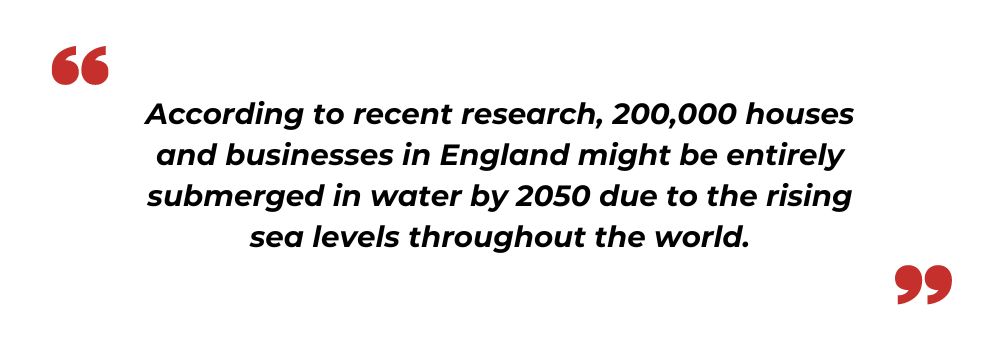
2. Sea Level
Some coastal dwellers across the world are disproportionately exposed as sea levels rise. By 2050, it is anticipated that sea levels along the English coast would have risen by around 35 cm. According to recent research, 200,000 houses and businesses in England might be entirely submerged in water by 2050 due to the rising sea levels throughout the world. Additionally, foreshores are eroding, which raises the waves, particularly during storms.
The risk of flooding is increasing significantly in many areas of the UK. People are losing their homes and lives as storms and flooding become increasingly severe and frequent. The coasts are progressively deteriorating as a result of sea-level rise. The effects of all these changes on plant and animal species are negative.
Also, Read - How is Climate Change Impacting the UK Summer 2022
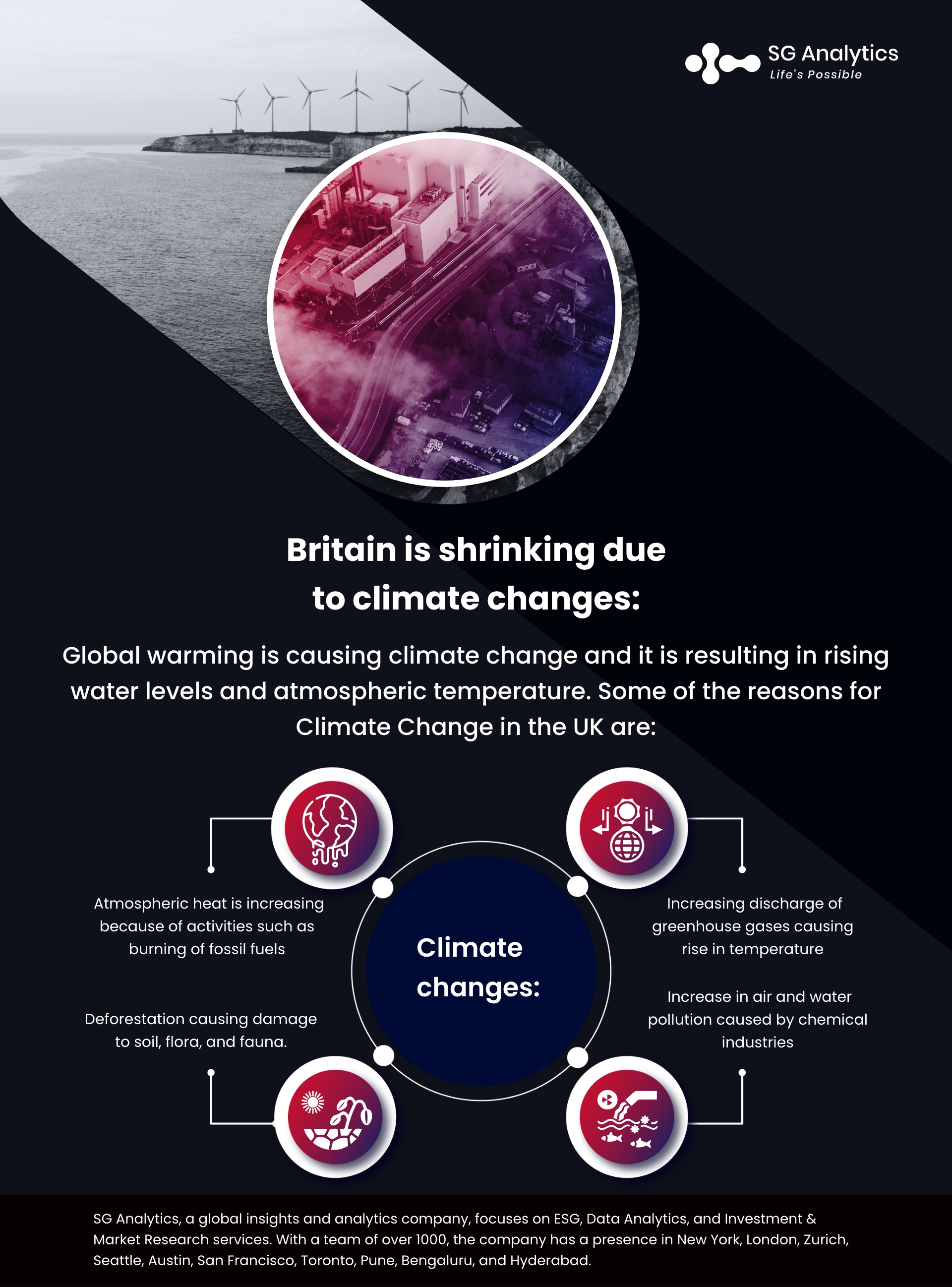
Conclusion
The study predicts that over the next few decades, summer rainfall would decline but winter rainfall will grow, even with a 2 degrees Celsius (3.6 degrees Fahrenheit) temperature rise relative to preindustrial levels. In England, 3 million homes might experience surface water flooding in areas without early warning systems. By cutting greenhouse gas emissions, all of these effects of climate change on the UK may be avoided. This entails, among other things, ceasing the use of oil and gas and switching to renewable energy. The good news is that scientists now think pollution reductions would have an immediate effect on temperatures.
We have an opportunity to halt the increase even though we cannot stop it. By 2050, more than a million residents in Britain will be at risk of flooding if we don't collectively modify our living patterns. Instead of "living with the penalties of inaction," it urged the government, industry, and larger society to implement adaptation and mitigation solutions. All regions of the UK are expected to experience significant changes in weather and climate patterns over the next 30 years (Climate Consulting) if no action is made to combat climate change.
With a presence in New York, San Francisco, Austin, Seattle, Toronto, London, Zurich, Pune, Bengaluru, and Hyderabad, SG Analytics, a pioneer in Research and Analytics, offers tailor-made services to enterprises worldwide.
A leader in ESG Consulting services, SG Analytics offers bespoke sustainability consulting services and research support for informed decision-making. Contact us today if you are in search of an efficient ESG integration and management solution provider to boost your sustainable performance.









